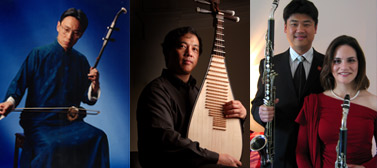
Hot News September 2006
|
|
|||
16 September 2006
Luigi and Laura Magistrelli
performing the Hoffmeister Concertante for 2 clarinets and orchestra
on September 16 in Cividate Camuno , Brescia, north part of Italy, with the new
born "Vivaldi Val Camonica "Orchestra conducted by Silvio Maggioni.
Cividate Camuno, Brescia Italy
Noted soloists Luigi and Laura Magistrelli, performed this work in this city with the above Orchestra, newly organized
consisting of musicians from several provinces to make for a new arts presence in this area in Italy. Magistrelli is well known
in this country and recognized as one of the top soloists in Europe. He is artist pro-active being Professor of Clarinette at the
Milano Conservatory, and having working connections with Karl Leister of the Berlin Philharmonic, of which the Mercandante
Clarinet Competition is approaching in October. Several Mozart recordings have been released with this trio.
 |

14 September 2006
Kalamazoo Gazette
By C.J. Gianakaris
Special to the Gazette
Recent seasons programmed by the Fontana Chamber Arts have stretched listening capacities of audiences by commissioning original works by gifted composers and by programming more ecumenical compositions from broader geographic areas of the musical world.
Wednesday evening's season opener, ``Bridges from the East,'' featured four newly commissioned works that required exotic musical instruments from China. The program at Dalton Center Recital Hall was largely successful.
Wang Guowei on the erhu (a two-stringed instrument) and Yang Wei on the pipa (a four-stringed, pear-shaped lute) are exceedingly fine artists who know how to coax extraordinary music from their instruments. Wang Guowei opened the program playing ``Song of Henan,'' a Chinese traditional piece. Sounding a bit like a fiddle, the erhu defined a thin, plaintive melodic line comparable to a singing voice.
Yang Wei followed on the pipa with ``Traditional Folksong of the Yi Tribe.'' Strumming and plucking the strings, he produced music akin to the banjo or mandolin. With picks on several fingers, Yang Wei brilliantly elicited full-ranged melodies.
John Bruce Yeh and Teresa Reilly, playing different-ranged clarinets, performed two works together -- the commissioned piece ``Little Cabbage,'' by Bright Sheng (present in the audience), and several selections from ``Two & Three Part Inventions,'' by J.S. Bach.
The work by Bright Sheng held greater interest because of his masterful scoring for E-flat and B-flat clarinets. Peng (Pamela) Chen's commissioned work ``Spring Silk II'' was also performed by the ensemble.
Rousing Wednesday's audience the most were commissioned works by Victoria Bond (who was present) and Lu Pei. ``The Birds and the Queen Phoenix,'' by Lu Pei, requires erhu, pipa, soprano clarinet and bass clarinet. Composed to artistically replicate the sounds of nature, particularly birds, the piece was a delight.
Uncanny naturelike sounds emerged from each of the instruments, including chirps, trilling, buzzing, tapping, croaking and, finally, a deluge of bird-whistle chirpings. The players seemed to enjoy performing the work as much as the audience enjoyed taking it in.
Victoria Bond stepped on stage to comment on the design of ``Bridges,'' her work for the ensemble. Four actual bridges inspired her, and each bridge was musically conveyed with wonderfully varied effects.
``Railroad Trestle Bridge, Galax, Virginia'' used the clarinets to produce the chugging sound of the railroad engine, with the pipa and erhu adding ``moving music'' and a random train-whistle sound. The concept here was clever and very well effected. ``Stone Bridge Over a Reflecting Pool in Souzhou'' permitted the erhu and pipa to transform their natural sounds into a lovely, meditative aura.
Two other bridge sections proved valid and interesting, but forced the erhu and pipa into traditional roles of fiddle and banjo, depriving them of their full attributes.
©2006 Kalamazoo
© 2006 Michigan Live. All Rights Reserved.
6 September 2006
|